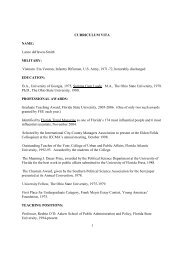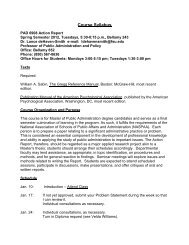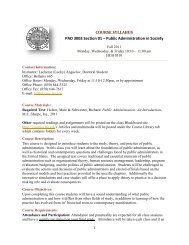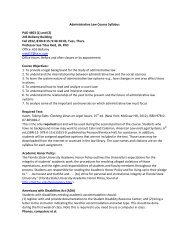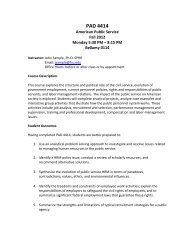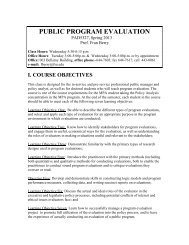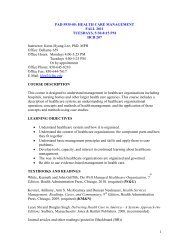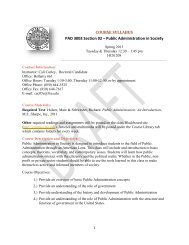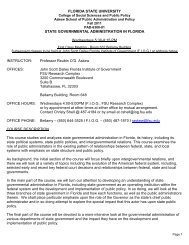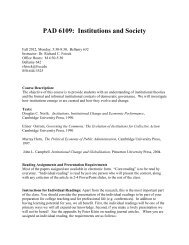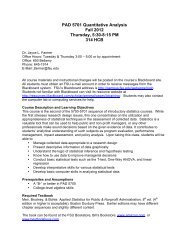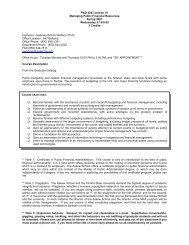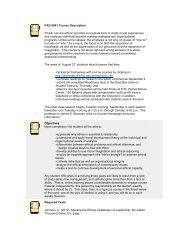PAD 3003-1 Public Administration in Society Spring 2012 8:00-9:15 ...
PAD 3003-1 Public Administration in Society Spring 2012 8:00-9:15 ...
PAD 3003-1 Public Administration in Society Spring 2012 8:00-9:15 ...
You also want an ePaper? Increase the reach of your titles
YUMPU automatically turns print PDFs into web optimized ePapers that Google loves.
<strong>PAD</strong> <strong>3<strong>00</strong>3</strong>-1 <strong>Public</strong> <strong>Adm<strong>in</strong>istration</strong> <strong>in</strong> <strong>Society</strong><br />
Spr<strong>in</strong>g <strong>2012</strong><br />
8:<strong>00</strong>-9:<strong>15</strong> Tuesday and Thursday<br />
Bellamy <strong>00</strong>23<br />
CONTACT INFORMATION<br />
Instructor: Jisun Youm, Doctoral Candidate<br />
Office: Bellamy 654<br />
Office Hours: Tuesdays and Thursdays 11:<strong>00</strong>am-12:<strong>00</strong>pm, or by appo<strong>in</strong>tment<br />
Office FAX: (850) 644-7617<br />
E-Mail: jy09@my.fsu.edu<br />
I. COURSE MATERIALS<br />
Required Text: Marc Holzer and Richard W. Schwester. <strong>Public</strong> adm<strong>in</strong>istration: An Introduction,<br />
M.E Sharpe, 2011.<br />
Other required read<strong>in</strong>gs and assignments will be posted on the class Blackboard site,<br />
(http://campus.fsu.edu).<br />
II.<br />
COURSE DESCRIPTION AND OBJECTIVES<br />
<strong>Public</strong> <strong>Adm<strong>in</strong>istration</strong> <strong>in</strong> <strong>Society</strong> is designed to <strong>in</strong>troduce students to the field of public<br />
adm<strong>in</strong>istration primarily through an American lens although some attention will be given to<br />
comparative public adm<strong>in</strong>istration issues. Students will learn how public adm<strong>in</strong>istration affects<br />
the lives of citizens through a comb<strong>in</strong>ation of class lectures, <strong>in</strong>-class activities, quizzes, exams,<br />
and presentations. Whether your term<strong>in</strong>at<strong>in</strong>g field is <strong>in</strong> the public, private, or non-profit sector,<br />
hav<strong>in</strong>g a general knowledge of the purpose and function of government is an important<br />
foundation for actively participat<strong>in</strong>g <strong>in</strong> society.<br />
Course Learn<strong>in</strong>g Objectives<br />
Provide a foundation for understand<strong>in</strong>g the basic concepts of public adm<strong>in</strong>istration<br />
Provide an understand<strong>in</strong>g of the functions and structure of government <strong>in</strong> the United<br />
States<br />
Provide an understand<strong>in</strong>g of the history and development of public adm<strong>in</strong>istration <strong>in</strong> the<br />
United States<br />
Provide an understand<strong>in</strong>g of the role of public adm<strong>in</strong>istration with<strong>in</strong> the structure and<br />
function of government <strong>in</strong> the United States<br />
1
III.<br />
CLASSROOM RULES<br />
Respect for both the <strong>in</strong>structor and classmates are mandatory. Unrelated conversation, pass<strong>in</strong>g<br />
notes, heckl<strong>in</strong>g, text messag<strong>in</strong>g and similar behaviors are not befitt<strong>in</strong>g of adult students and will<br />
not be tolerated. Students are expected to turn cell phones off for the entire class. If students<br />
are distracted by cell phones, other students or other media, those caus<strong>in</strong>g the distraction<br />
will be asked to leave the classroom for the rema<strong>in</strong>der of that class period. If a student must<br />
arrive late or leave early, or <strong>in</strong> case of emergency, they should do so as unobtrusively as possible.<br />
Violat<strong>in</strong>g these rules may affect your class participation grade.<br />
IV.<br />
GRADING/EVALUATION<br />
A 93-1<strong>00</strong>%<br />
Weekly Paper (20%) A- 90-92%<br />
Quizzes (20%) B+ 87-89%<br />
Exams (60%) B 83-86%<br />
B- 80-82%<br />
C+ 77-79%<br />
C 73-76%<br />
C- 70-72%<br />
D+ 67-69%<br />
D 63-66%<br />
Total 1<strong>00</strong>% F 0-62%<br />
V. ASSINGMENTS/RESPONSIBILITY<br />
Class Attendance and Participation<br />
Students are expected to attend all classes and actively participate <strong>in</strong> class discussion. It is the<br />
student’s responsibility to complete the assigned read<strong>in</strong>gs prior to the respective classes.<br />
Effective participation requires student’s preparation for the class and active <strong>in</strong>volvement <strong>in</strong> the<br />
class. Attendance and punctuality are expected and are strictly measured through the class roster<br />
sign-<strong>in</strong> sheet. Unexcused absences and late arrival to class will be taken <strong>in</strong>to account <strong>in</strong> the<br />
determ<strong>in</strong>ation of your f<strong>in</strong>al grade. Each unexcused absence will result <strong>in</strong> a reduction of your<br />
f<strong>in</strong>al grade by 1%. Three late arrivals will result <strong>in</strong> the same penalty as one unexcused absence.<br />
If an absence is unavoidable, it is the student’s responsibility to notify the <strong>in</strong>structor prior to<br />
the class.<br />
Excused absences <strong>in</strong>clude documented illnesses, deaths <strong>in</strong> the immediate family and other<br />
documented crises, call to active military or jury duty, religious holy days, and official<br />
University activities. Accommodations for these excused absences will be made <strong>in</strong> a way that<br />
2
does not penalize students who have a valid excuse. Consideration will also be given to students<br />
whose dependent children experience serious illness.<br />
Weekly-Class Paper (20%)<br />
Before the first class of each week, every student must prepare a 4<strong>00</strong> m<strong>in</strong>imum word summary<br />
of the read<strong>in</strong>g materials for that week. It should conta<strong>in</strong>:<br />
a. summary of the current materials<br />
b. the l<strong>in</strong>kages between current materials and those of a previous week or other courses<br />
c. at least one discussion question that would <strong>in</strong>terest from read<strong>in</strong>g materials.<br />
This assignment should be dropped <strong>in</strong>to Assignment box <strong>in</strong> Bb by 10:<strong>00</strong> am Monday with the<br />
summary as an attachment.<br />
Only 10 weekly class papers will count as your f<strong>in</strong>al grade. (Each paper is worth two po<strong>in</strong>ts)<br />
Quizzes (20%)<br />
10 quizzes will be given <strong>in</strong> class. Each quiz will consist of true/false and multiple-choice<br />
questions. Dur<strong>in</strong>g a quiz, textbook and personal note use dur<strong>in</strong>g quiz time is strictly forbidden.<br />
The best 5 quizzes will count towards your f<strong>in</strong>al grade for quizzes. Make-up quizzes will not be<br />
given.<br />
Exams (60%)<br />
Two exams will be given for this class. Each will consist of true/false, multiple-choice, and<br />
short answer questions. The use of books and/or notes is prohibited dur<strong>in</strong>g these exams. If a<br />
student is unable to take an exam on its scheduled day and time, the student must make prior<br />
arrangements to take a make-up. In order to make up exam(s), s/he must have a university<br />
accepted excuse (check the FSU student handbook for a description of acceptable excuses). If<br />
the excuse is approved by the <strong>in</strong>structor, the student will be allowed to take an alternate exam.<br />
Students with unexcused absences for an exam will receive a zero for their score; no exceptions.<br />
VI.<br />
ACADEMIC CONDUCT<br />
The FSU Honor Code<br />
Students are expected to uphold the Academic Honor Code published <strong>in</strong> the Florida State<br />
University Bullet<strong>in</strong> and the Student Handbook. The Academic Honor Code of The Florida State<br />
University requires students to (1) uphold the highest standards of academic <strong>in</strong>tegrity <strong>in</strong> their<br />
own work, (2) refuse to tolerate violations of academic <strong>in</strong>tegrity <strong>in</strong> the university community,<br />
and (3) foster a high sense of <strong>in</strong>tegrity and social responsibility. Violations of the Academic<br />
3
Honor Code are available at http://dof.fsu.edu/honorpolicy.htm and are listed <strong>in</strong> general from the<br />
Academic Honor Code Policy as:<br />
1. PLAGIARISM. Intentionally present<strong>in</strong>g the work of another as one’s own (i.e., without<br />
proper acknowledgement of the source)<br />
2. CHEATING. Improper application of any <strong>in</strong>formation or material that is used <strong>in</strong><br />
evaluat<strong>in</strong>g academic work<br />
3. UNAUTHORIZED GROUP WORK. Unauthorized collaborat<strong>in</strong>g with others<br />
4. FABRICATION, FALSIFICATION, AND MISPERRESENTATION. Intentional and<br />
unauthorized alter<strong>in</strong>g or <strong>in</strong>vent<strong>in</strong>g of any <strong>in</strong>formation or citation that is used <strong>in</strong> assess<strong>in</strong>g<br />
academic work<br />
5. MULTIPLE SUBMISSIONS. Submitt<strong>in</strong>g the same academic work (<strong>in</strong>clud<strong>in</strong>g oral<br />
presentation) for credit more than once without <strong>in</strong>structor permission. It is each<br />
<strong>in</strong>structor’s responsibility to make expectations regard<strong>in</strong>g <strong>in</strong>corporation of exist<strong>in</strong>g<br />
academic work <strong>in</strong>to new assignments clear to the student <strong>in</strong> writ<strong>in</strong>g by the time<br />
assignments are given.<br />
6. ABUSE OF ACADEMIC MATERIALS. Intentionally damag<strong>in</strong>g, destroy<strong>in</strong>g, steal<strong>in</strong>g,<br />
or mak<strong>in</strong>g <strong>in</strong>accessible library or other academic resource material.<br />
7. COMPLICITY IN ACADEMIC DISHONESTY. Intentionally help<strong>in</strong>g another to commit<br />
an act of academic dishonesty.<br />
8. ATTEMPTING to commit any offense as outl<strong>in</strong>ed above.<br />
The student is responsibility for understand<strong>in</strong>g the legitimate use of sources, the appropriate<br />
ways of acknowledg<strong>in</strong>g academic, scholarly or creative <strong>in</strong>debtedness, and the consequences<br />
of violat<strong>in</strong>g this responsibility. Students should pay special attention to #2, above. Any<br />
<strong>in</strong>stance of <strong>in</strong>tellectual dishonesty will result <strong>in</strong> a grade of F for the course and may result <strong>in</strong><br />
suspension or expulsion. If you do not understand the rules for <strong>in</strong>tellectual dishonesty, please<br />
ask s<strong>in</strong>ce you are responsible for adher<strong>in</strong>g to this policy.<br />
VII. AMERICANS WITH DISABILITIES ACT<br />
Students with disabilities need<strong>in</strong>g academic accommodation should: (1) register with and<br />
provide documentation to the Student Disability Resource Center; and (2) br<strong>in</strong>g a letter to the<br />
<strong>in</strong>structor <strong>in</strong>dicat<strong>in</strong>g the need for accommodation and what type. This should be done dur<strong>in</strong>g the<br />
first week of class. This syllabus and other class materials are available <strong>in</strong> alternative format<br />
upon request. For more <strong>in</strong>formation about services available to FSU students with disabilities,<br />
contact the:<br />
Student Disability Resource Center (850) 644-9566 (voice)<br />
97 Woodward Avenue, South (850) 644-8504(TDD)<br />
108 Student Service Build<strong>in</strong>g sdrc@adm<strong>in</strong>.fsu.edu<br />
4
Florida State University http://www.disabilitycenter.fsu.edu/<br />
Tallahassee, FL 32306-4167<br />
VIII. SYLLABUS CHANGE POLICY<br />
This syllabus is a guide for the course and is subject to change with advance notice.<br />
IX.<br />
COURSE OUTLINE AND READINGS<br />
Week 1 (1/05): Introduction<br />
Read<strong>in</strong>gs: <strong>PAD</strong> <strong>3<strong>00</strong>3</strong>-01 Syllabus.<br />
Review of course requirements, class policies, and procedures.<br />
Week 2 (1/10&1/12): Def<strong>in</strong><strong>in</strong>g <strong>Public</strong> <strong>Adm<strong>in</strong>istration</strong><br />
*1/12: No Class<br />
Read<strong>in</strong>g: Holzer&Schwester, Chapter 1<br />
Week 3 (1/17&1/19): Organization Behavior & <strong>Public</strong> <strong>Adm<strong>in</strong>istration</strong><br />
Read<strong>in</strong>g: Holzer&Schwester, Chapter 2<br />
Week 4 (1/24&1/26): Personnel Management<br />
Read<strong>in</strong>g: Holzer&Schwester, Chapter 3<br />
Week 5 (1/31&2/2): Decision Mak<strong>in</strong>g<br />
Read<strong>in</strong>g: Holzer&Schwester, Chapter 4<br />
Week 6 (2/7&2/9): Politics and <strong>Public</strong> <strong>Adm<strong>in</strong>istration</strong><br />
Read<strong>in</strong>g: Holzer&Schwester, Chapter 5<br />
* Woodrow Wilson “Study of <strong>Public</strong> <strong>Adm<strong>in</strong>istration</strong>” In J.M.Shafritz & A.C. Hyde (Eds),<br />
Classics of <strong>Public</strong> <strong>Adm<strong>in</strong>istration</strong> (Sixth ed.). Boston: Thomson Wadsworth (Bb)<br />
Week 7 (2/14&2/16): Federalism<br />
Read<strong>in</strong>g: Holzer&Schwester, Chapter 6<br />
* Wright, D.S. (1990). Federalism, Intergovernmental Relations, and Intergovernmental<br />
Management: Historical Reflections and Conceptual Comparisons. <strong>Public</strong> <strong>Adm<strong>in</strong>istration</strong><br />
Review, 50(2), 168-178. (Bb)<br />
Week 8 (2/21&2/23)<br />
2/21 Review For middle term exam<br />
2/23 Middle Term Exam<br />
Week 9 (2/28&3/1): Performance Management<br />
Read<strong>in</strong>g: Holzer&Schwester, Chapter 7<br />
5
Week 10 (3/6&3/8)<br />
Spr<strong>in</strong>g Break – No Class<br />
Week 11 (3/13&3/<strong>15</strong>): Program Evaluation<br />
Read<strong>in</strong>g: Holzer&Schwester, Chapter 8<br />
Week 12 (3/20&3/22): Budget<strong>in</strong>g<br />
Read<strong>in</strong>g: Holzer&Schwester, Chapter 9<br />
Week 13 (3/27&3/29): Executive & Adm<strong>in</strong>istrative Leadership<br />
Read<strong>in</strong>g: Holzer&Schwester, Chapter 10<br />
Week 14 (4/3&4/5): <strong>Public</strong> Ethics<br />
Read<strong>in</strong>g: Holzer&Schwester, Chapter 11<br />
* Visit the website of Florida Commission on Ethics<br />
(http://www.ethics.state.fl.us/ethics/)<br />
Week <strong>15</strong> (4/10&4/12): Technology & <strong>Public</strong> <strong>Adm<strong>in</strong>istration</strong><br />
Read<strong>in</strong>g: Holzer&Schwester, Chapter 12<br />
* No Class: 4/12<br />
Week 16 (4/17&4/19): <strong>Public</strong> Service & Culture and the Future of <strong>Public</strong> <strong>Adm<strong>in</strong>istration</strong><br />
Read<strong>in</strong>g: Holzer&Schwester, Chapter 13&14<br />
* 4/19 Review for F<strong>in</strong>al Exam<br />
Week 17 (4/24)<br />
F<strong>in</strong>al Exam<br />
6



